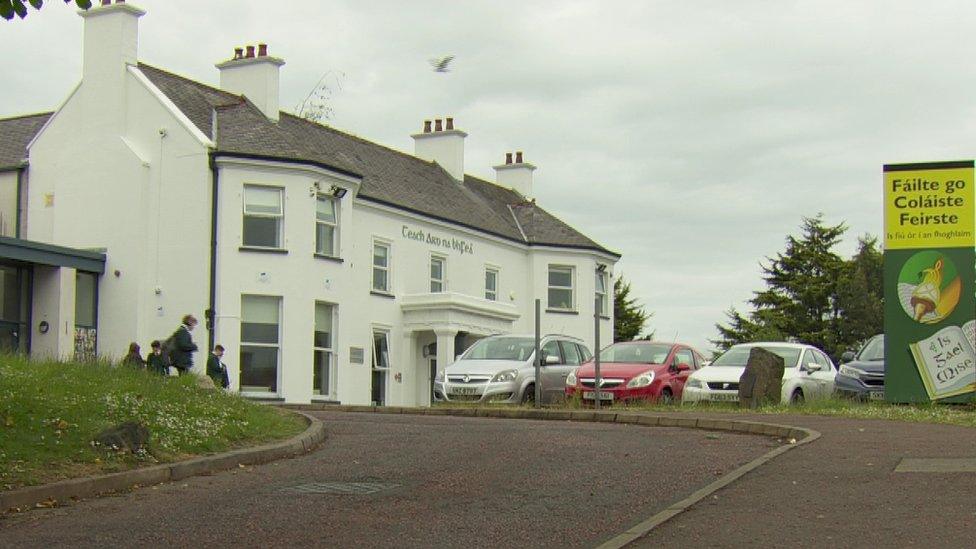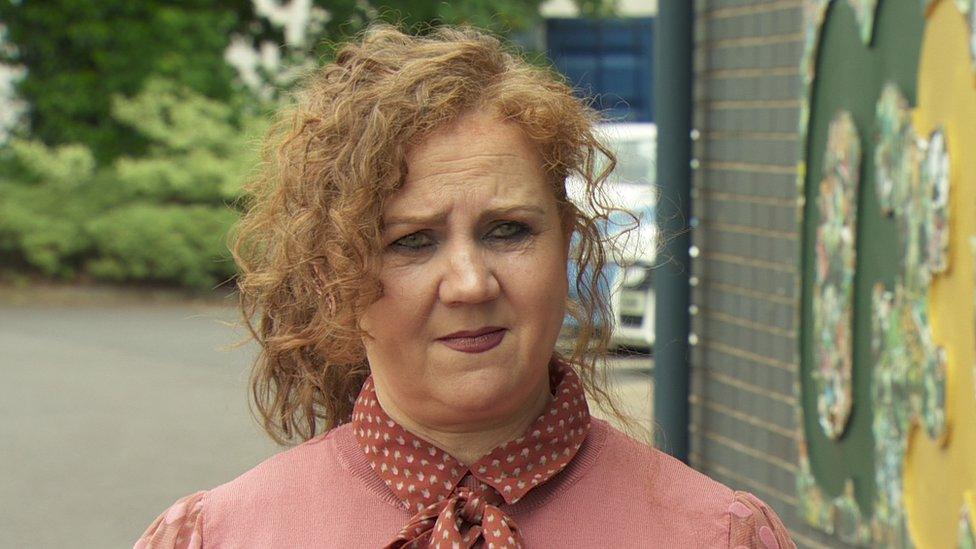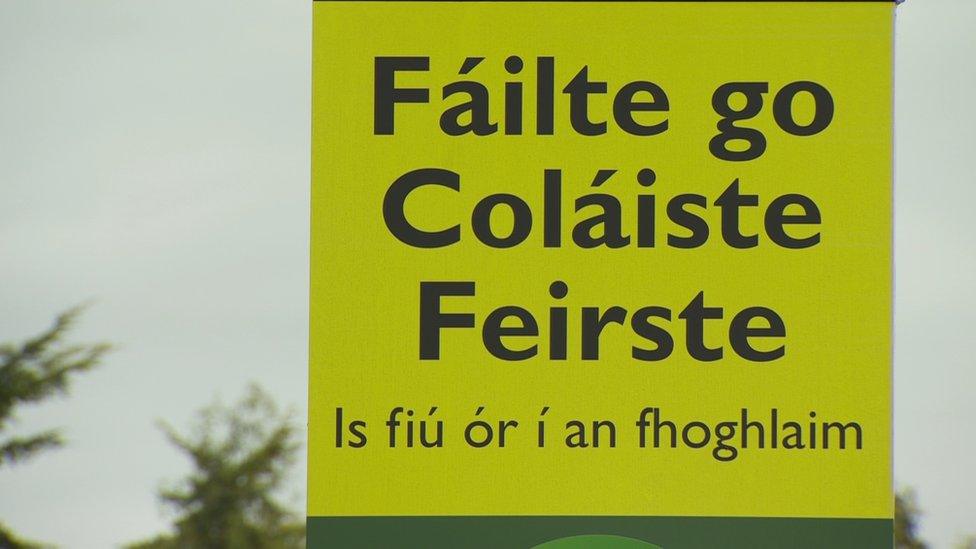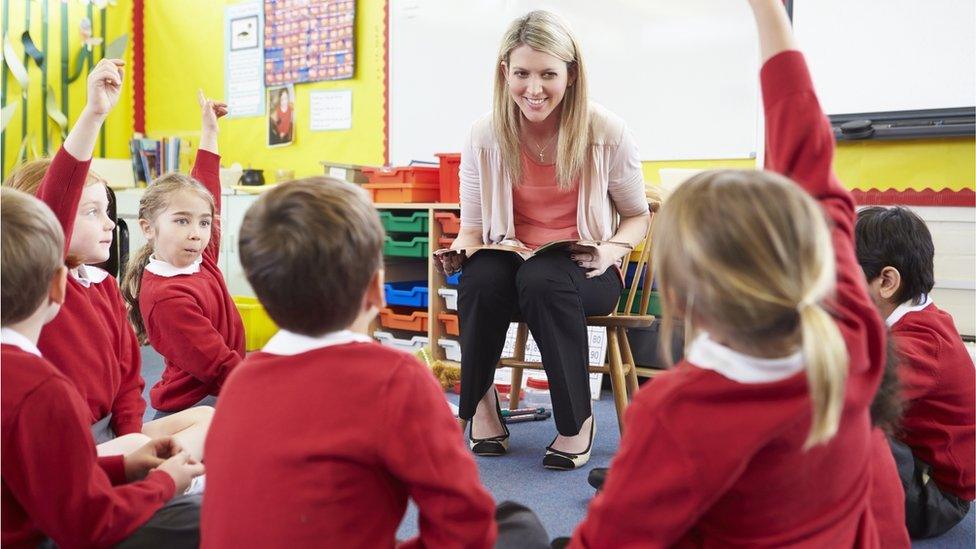Restorative practice: Belfast school's approach to tackling misbehaviour
- Published

Coláiste Feirste has about 900 pupils
"I'm old enough to know that it's childish and I shouldn't be doing it."
A few weeks ago two junior pupils from Coláiste Feirste in west Belfast were caught in a minor act of anti-social behaviour on a bus.
They received a short suspension from the school, but that was only the beginning of enabling them to face what they had done.
That is because Coláiste Feirste uses a method called restorative practice when trouble arises.
It means children and young people at the school - which has about 900 pupils - are taught about the impact and consequences of their actions through a series of meetings and conversations.
In the case of those two pupils, that culminated in a meeting with an inspector from public transport provider Translink.
'Repairing relationships'
According to Coláiste Feirste's vice-principal Emer Mhic an Fhailí, restorative practice increases accountability and helps build back relationships.
"If children fall you put a band aid on," she told BBC News NI.
"In situations like bullying or where there's been some incident that's happened in school children need the opportunity to repair that relationship again, to make friends again, to be accountable at their level.
"This provides an open forum where you can have those discussions without just a punitive action that means nothing overall when a child returns to school.
"You still of course have all of your sanctions but it means that there's an honest conversation whereby you're repairing relationships."

Emer Mhic an Fhailí says restorative practice helps build relationships
In schools where restorative practice is used to try to resolve bullying, anti-social behaviour or other incidents, pupils are often asked to talk through a series of questions.
That includes what happened, what they were thinking about at the time, who was affected by what they did, and what needs to happen to make things right?
A previous study carried out by the Department of Education in England found using that kind of approach could help to reduce and prevent bullying in school and bring down the number of pupils suspended or expelled.
'I was in the wrong'
The pupils involved in the anti-social behaviour on the bus spoke to BBC News NI.
"I was suspended for three days and came back and had a meeting about it, and then two people came in and had meetings with me about how we could resolve the problem," one said.
"They were asking me how was I feeling when I did it? What made me do it? Who was affected by the situation?
"It just made me realise I was in the wrong and I shouldn't have done it.
"It made me feel like I need to be the bigger person and sort it out myself."
Ms Mhic an Fhailí said that meant the children had to think about the impact on other people of what they had done.
"What they thought was going to last a couple of seconds on a bus actually has ramifications on so many other people and so many organisations," she said.
"So in this instance we had to talk to children, we had to talk to their parents, we had to talk to two or three representatives from Translink."
The incident culminated in a meeting at Coláiste Feirste between the pupils and a Translink inspector.
Both pupils decided to apologise to him.
"I was raging with myself and they spoke to me about it and they told me that they were going to get the man from Translink to come in," one told BBC News NI.

"It wasn't about blaming anyone, we just needed to sort it out.
"They told me I don't have to, but if I felt the need to apologise for what I'd done then to do it.
"I apologised to him, I really felt bad for what I'd done and I'm old enough to know that it's childish and I shouldn't be doing it.
"It's made me realise how important it is - all the services that the bus gives."
'Duty of care'
Coláiste Feirste has adopted to the approach across the whole school and has received support and advice from the Education Authority and restorative practice trainer Martina Jordan.
"This way they get to think very holistically about who and what was impacted by what they did," Ms Mhic an Fhailí said.
"It is our duty of care for children who do wrong or break rules as such to guide them in the best way.
"If children aren't happy, if children don't have scaffolds and support they can't learn."
Related topics
- Published21 November 2016
